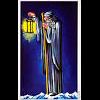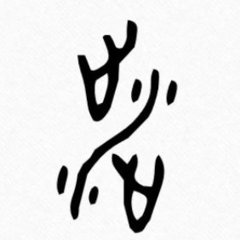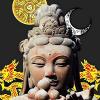Search the Community
Showing results for 'Dream'.
Found 7,590 results
-
Many years ago I had a dream where I looked out of a large window and saw the ‘oceanriver’. I was thinking about this image and this specific word yesterday, along the lines of when the river merges with the ocean the river no longer exists in the same form but has become perceptibly more, but also that the ocean is no longer just ocean but has become imperceptibly more. I think reaching the point where the river is merged to that extent, no ego would remain.
-

Wu Xing and Tibetan Buddhist/Other Elemental Theories
Nungali replied to Fate's topic in General Discussion
Since IMO the 'elements' are not things but concepts then the meaning and arrangement of them changes according to the conceptual use. One use I see as 'hierarchical' - not so much that each is 'subordinate' to another, all interact, but there is 'order of manifestation'.- is in the comparison to 'parts of the psyche' : Very simply; Fire - inspiration, Water - 'feeling' assesment, Air - 'mental assesment', Earth - putting the above into action. Many do not understand fire, inspiration, individuation, connection to spirit , also with water ; emotions are unclear, confused and clouded, misunderstood, etc. This leaves the mind to be head of the hierarchy, and many systems teach about the dangers of that, and how the mind needs to be regulated or trained. Of course, without the earth action grounding at the end, the whole exercise was a pipe dream and never manifested.. With out regulation from air - intellect, mentation, calculation, planning, assesment, inspoirations or feelings dont manifest, or without intelligent critical ability ... all sorts of phantasms are chased , asserted and believed in. If water is lacking so is feeling, a deeper connection, things have to 'feel right' sit right in the unconscious, some even say to 'sleep on' an important decision. What is this but 'running it through' the unconscious? . And of course, without fire we have no individual inspiration or good and original ideas in the first place. So most of us chug along, with mind trying to run the machine. Mind is not the 'ruler' , it has a job to do and should do it in its place of 3rd regulator. Of course, mind being used to thinking it is boss will rebel at this concept ... its up to us to persuade it and get it to see 'reason'. Air is interesting in that is also 'pnuema' breath , animating breat and spirit. So air can be 'spirit' or 'element' . Metal ? I dont see how it fits in , I have never really looked into the systems with metal included. From here, it looks like it is a result of the above 4 ( metal not appearing commonly in nature, it takes human ingenuity and the above 4 principles to make it - in the form we use it. I dont see a gender hierarchy , each element is receptive to the one 'above' and gives its energy to the one 'below'. The 'units' exist in polarities . -
I have both of the dream yoga books, and would generally recommend TWR over ChNNR dream yoga book. The reason is that ChNNR is fairly tightly wrapped up with his method of guru yoga, which requires transmission (although this tranmission is fairly freely given). I do think dream yoga generally is tightly wound up with general Buddhist practice. I believe in both cases that dream yoga is a secondary practice. Beyond that, there is also quite a bit of Buddhist symbolism, and this symbolism integrates into a larger practice context. A lot of the symbols get there power through frequent use in different contexts. For example, the Tibetan letter "AH" is very important in certain practices, but may not be as important to someone who doesn't practice in this way. So working with this letter is going to be a different experience depending on one's background.
-

Longevity or Immortality . . . But Not Both (?)
Karl replied to Lataif's topic in General Discussion
Q So the world is not really illusory A at the level of the spiritual seeker you have got to say the world is an illusion. There is no other way... There is no universe without the self. So long as man does not see the self which is the origin of all, but looks only at the external world as real and permanent, you have to tell him that this external universe is an illusion. Sankara: Brahman is real The universe is unreal, and The universe is Brahman. Q so the world is real when it is experienced as the self and unreal when it is seen as separate names and form. A just as fire is obscured by smoke, the shining light of consciousness is obscured by the assemblage of names and forms the world. When by compassionate divine grace the mind becomes clear , the nature of the world will be known to be not the illusory forms, but on the reality. Q I cannot say this is all clear to me. Is the world that is seen, felt and sensed by U.S. In so many ways something like a dream, an illusion. A there is no alternative for you but to accept the world as unreal if you are seeking the truth and truth alone. Q why so? A for the simple reason that unless you give up the idea that the world is real then your mind will always be after it.if you take the appearance to be real you will never know the real itself, although it is the real alone that exists.The point is illustrated by the analogy of the snake in the rope. You may be deceived into believing that the piece of rope is the snake. While you imagine the rope is the snake you cannot see the rope as a rope . The non existent snake becomes real to you , while the real rope seems wholly non existent as such. Excerpts from 'be as you are' the teachings of Sri Ramana Maharshi p187/188 -
I also find there are varying degrees of lucidity. Some are more stable and allow more methodical action. In general, there is not a lot of time for me to waste, I need to be able react immediately and engage in whatever lucid activity I choose. They key again is to set a very strong intention prior to sleep rather than trying to act on the fly during the dream. This doesn't always work but it helps.
-
Half the reason I would lose a lucid dream was because I got so excited that I had become lucid, and interested in exploring my lucidity, that I would wake up. So I started trying to remind myself that the next step when lucidity was reached was to try to do very little, to avoid that effort of will which would spark a wake up.
-
As far as I know, the dream yoga workshops are conducted through the glidewing productions website. Last I checked the next one's date is TBA. The ligmincha.org website should have more info. Thanks for the offer - I'm pretty much married to the Bönpo approach right now. It's working for me (albeit slowly) and fits into the context of my other practices.
-
The book by Tenzin Wangyal Rinpoche is the book I recommended earlier. That covers the Bönpo methods quite comprehensively. The book by Chogyal Namkhai Norbu is probably quite good but I've never read it so I can't comment. Those were mentioned in post #3 I don't want to get too specific because I'm a student, not a teacher of this method and would prefer everyone learn from a more authoritative source. From the instructions I've received from Tenzin Wangyal Rinpoche through his book, an online course, and a personal retreat, the way to develop stability seems to be focused on - 1. Developing more and more stability in our connection with the nature of mind through the 3 doors practices. This is the key. From the perspective of the nature of mind, dreams and waking life are on equal footing. So it is this perspective that helps us gain the freedom to be lucid in our waking life and in dreams. I suspect that the Daoist approach is similar in that meditation and qigong are doorways to this fundamental nature, as are the 3 doors. 2. Strengthening our intention to engage in and be successful with the practice through prayer and feelings of gratitude, devotion, and trust. This is a very traditional approach. The "fuel" of Tibetan Buddhist practices is both external and internal refuge. While Tenzin Wangyal Rinpoche seems to be very progressive in his teaching method on the surface, I suspect that he is very traditional at heart. He seems to be doing his best to adapt tradition so that it is accessible and effective for Westerners. 3. Avoiding the error of letting our ignorance and grasping from interfering with the process. This is done through approaching the practices with a sense of playfulness along with the gratitude and trust. This is the antidote to frustration. In the morning we review the night, celebrate any success, and recommit to the practice. We do not indulge in frustration or self criticism. When those feelings arise, as they inevitably will, we acknowledge them, see them for what they are (transient thoughts, expectations, grasping), and allow them to fully be and then go back to where they came from - emptiness. I think it's very important to be careful about building up too much emphasis on success and failure, expectations and attachment to the method. The method is powerful. It will yield its bounty in its own good time based on our proclivity and dedication. If it is not yielding the type of result we want, we will have a better chance of success if we figure out how to be OK with that - it means we need to focus on our connection to the source and look more carefully at how we are doing the daytime and nighttime practices. There are more helpful suggestions regarding how to stabilize and progress in the book and if you sign up for an online workshop, you can ask Rinpoche questions directly. I don't have any experience with any other dream yoga instructions or instructors so I won't comment much on others. Rinpoche did make the point that Western teachers tend to be more focused on the content and self indulgence. The Tibetan approach always stays anchored in the mindset of working toward liberation in order to help others, the Mahayana view. All of the above is just my own personal opinion and experience. I'm not authorized or qualified to teach this stuff. Just trying to help people understand its existence, value, and availability, and answer these excellent questions as best I can. Good luck!
-
I would add that what we experience is a creation of the minds, plural. Whether you see it as the unconscious, subconscious, and conscious; LDT, MDT, UDT; or the enteric, somatic/autonomic, and central nervous systems, etc. It is a unified axis of minds which can maintain supreme awareness within, regardless of which mind you are most in. Anyways, I used to practice westernized lucid dreaming techniques, and had good results with the following techniques: -wake to sleep: set your alarm early, then go right back to sleep -constantly question whether you are dreaming, all day long...this will ingrain the habit within you, and result in catching dreams. -find cues in everyday themes that trigger a 'am I dreaming check' such as any time you see sneakers, or anytime you notice yourself playing with a ring you usually wear, etc. -tratak exercises -pure intention to wake up in the dream, either through mantra, or direct without words, held strong until one falls asleep -master relaxation technique so fierce, that one can go directly from wake to dream, without losing lucidity. Practice a one hour savasana sometime
-
Steve, I have several more questions for you. Would you recommend these two books for someone interested in learning the Tibetan methods? Here & here Also, what do the day practices in the Tibetan methods consist of? In the western methods there is the constant critical state testing in which you ask yourself if you're dreaming or awake whenever a "dream sign" pops up in your waking life. This is mainly to train the critical thinking faculties in your mind. Then there is also the prospective memory exercises to train your mind to remember for a planned future event. In this case it is literally to train your mind to remember when you're actually dreaming. In the Taoist methods Michael Winn says that building your energy body through your daily qigong practice naturally makes the lucid dreaming practices at night nearly effortless compared to anything else. The western and Taoist methods do resemble one another when it comes to things such as setting your intentions, reflecting on your dreams & doing a dream gesture or reality check but do vary significantly when it comes to daytime practices. Lastly, how do the Tibetans stabilize the dream state? I've had tons of lucid dreams lasting under 30 seconds. It's rather frustrating. In the western methods taught by LaBerge he recommends spinning to prolong the dream. That never worked for me. I've found that staring at the ground beneath my feet and then looking away is a hit or miss method. I can sometimes dream lucidly for around 5-15 minutes with that method. My conclusion is that the western methods consist of too much pointless effort and can only work so well. Even seasoned lucid dreamers have issues and tend to look towards chemicals and even then there is no guarantee of success. In the western methods there is no emphasis in meditation, energy work, visualization or building mindful awareness. You have the so called skeptics behaving as if they know more about dreams and dreaming practices than the Tibetans themselves. Pathetic.
-
I've been using TWR's dream yoga techniques for the past few nights and it has certainly increased my overall dream recall.
-
I feel that the methods introduced by Stephen LaBerge lack any serious thought to building a solid foundation. His teachings are distilled from Tibetan techniques and they do work but only to an extent. Not to mention that his approach is rather dry and an attempt to literally strip out all spiritual aspects of dream yoga.
-
I assume you mean this one : "The American dream, you have to be asleep to believe it" ha!
-
It isn't in what you say Nikolai. It doesn't matter if you believe it's true or, believe it's rubbish. The paradox only exists as long as you let it. You hold two conflicting premises. Of course my words have a vulgar consistency for you. Ignore the book, I wrote it when I thought as you do now. I was showing only that this is the process like one half of a journey. It is objective reality that you believe what you believe is true, or believe what you believe is subjective nonsense. The content doesn't matter. I said before its either the red or the blue pill. You either want to know objective reality, or you want to stay in the subjective program of the Matrix. That is something you have to chose. Not everyone likes reality, that's an objective truth for you. As Cypher said "ignorance can be bliss", he despised everything about the real world, it was miserable experience for him and he hated Morpheus for doing it to him. He said Morpheus had lied to make him take the red pill, he said, if he had known, he would have told him to shove it up his back side. Do you understand why my words are vulgar to you ? They are poison to your beautiful subjective dream, bitter, harsh, blunt. I couldnt blame you for taking the blue pill.
-
Being capable of disagreement with me makes it right, regardless of statement of the disagreement which may be valid or not. It is entirely possible to make a valid statement-in the sense of inductive reasoning-but still be ignorant of why it is valid. A thing is a thing and no other thing. This was the reasons monks battered their students with sticks once they moved into subjective illusion and believed they had transcended mortality . It literally was 'to knock sense into them'. It's very hard to deny a stick is a stick, a body is a body and pain is pain. We have one tool and that's logic. It is a birth right, but it can be abused and oppressed. Remembered knowledge is mistaken for true knowledge. We are losing the ability to use logic effectively. This is a modern world of skills and specialisation, in which the incredible progress afforded by the division of labour and the laws of comparative advantage have led to a situation in which logic has been largely usurped by the instantaneous nature of our lives. It has created a longing for a return to a simpler time, but without logic to guide our understanding, we have become attracted to a mash up of facts, pseudoscience, religion, mysticism, superstition and Magic. These things are entirely knowledge based-in effect it's another skill. If all we have to guide us is emotional intuition ( feelings ) then we are in danger. If you don't know what a Tiger is, or if you dispute that it is a Tiger, or believe that it is nothing but an illusion of consciousness subjectivity-akin to a dream-then you are seeking to hide from reality. The legend of King Canute is a classical example of that mode of thinking. The Tiger will attack you if it is its intention to do so and the sea will advance. It's been the case for many years that those prepared to shout truth from the rooftops usually get short shrift by the residents. If they are lucky it's only verbal abuse.
-
To be honest, I also have not seen this among daoist literature... but I recently came across "The Tibetan Yogas Of Dream And Sleep"... I can't recommend it as I have not read it yet but I can at least mention it in case you want to find it. I don't think one "enters the kingdom" , except in their own interpretation of events (time). The last barrier is a state but IMO, we can 'borrow' from states even though we're not in that state... because the most important aspect is: Nothing Separates Us. As I explore this, at times I am floating above and getting detached from it. As I get into universal consciousness, I travel past time and space, as it collapses (no separation). Sometimes it collapses on 'me'.
-
It may be obvious to the intellect, but how deeply do we feel and know that. If we know that to the very core of our being, the remainder of this question would not arise. Yes, dream yoga does help with that. So many of our responses to "external stimuli" are conditioned by patterns we have inherited and developed throughout our lifetime(s). These patterns are often dysfunctional and perpetuated in un-awareness. In dreams, we have more freedom and the patterns not as strong. We are able to change the external circumstances to suit our needs in a way that we feel incapable of doing in our waking life. This can give us more confidence and more awareness in terms of how we react in our waking lives to both internal and external forces. In dream, we can also tap into and express qualities that are obscured in waking life, I mention these earlier as the 4 qualities of enlightened beings/minds. As these are more fully expressed, that can transform our lives in powerful ways. Remember that the dream yoga is not just a dream practice, it is a lifetime practice and sleep, dream, and waking. Through both the waking and sleeping practices, we are able to live more flexible, confident, and aware lives.
-
Something to keep in mind...... For someone who is seriously walking the PATH, faithfully and observing the various necessities (sila, samadhi, panna), dream-yoga arises naturally. No need for any specific herbs/drugs or effort to create lucid dreams. A serious student keeps his attention on strengthening the foundation, because without proper foundation anything built on it is likely to fall down/regress/fall-back, and one is forced to restart the building process, without ever reaching higher levels. I am not discouraging in any way. A yogi is awake, when the whole world sleeps. This does not mean he is a night-owl
-
Of course everything is creation of the mind, this is obvious. Slight problem though comes from the fact that the mind can create responses to external stimuli and to internal ones. Responding to external stimuli or interpreting them in a right and adequate way may have life or death consequences. Whereas when mind responds to internal stimuli, it could mean anything or nothing at all. The difference is significant. Does dream yoga help with that?
-

We Never Really Die: The Science behind Eternal Consciousness
Karl replied to SonOfTheGods's topic in General Discussion
Who is tub thumping ? I'm simply reacting to things like litmus paper to acid. I do not say this is true, that is true. I only say 'find the truth' . Your reality is your reality. If you dream this or that, then can I say it is not true that you dream it ? No. I cannot. If you say there is a green goblin that I must see, then I shall ask you to prove it. This is all I can do. -

We Never Really Die: The Science behind Eternal Consciousness
Nikolai1 replied to SonOfTheGods's topic in General Discussion
Very nice - but If that was true you wouldn't bother tub thumping for all your world of objective realities. You simply need to realise that in any given moment we can judge something as either real or ideal. In any given moment, one perspective is in the limelight, but in our heart we know and feel that the other perspective is also there, in the shadow. If something seems real, we still do not let it bother us...we cannot...because in a deep way we know it is a dream. If something seems unimportant and dreamlike, we still attend to it because deep down we know it is also real. This is wisdom. It is folly to set up this biocentrism as some great grand truth, but this guy is only led to do so because the grand truth of a big wide universe of matter is also a folly. It's a shame that you grasped what most find unbelievable, included the ideas in your book, and then scurried back to your original view. You still aren't synthesising. Synthesis IS a moment by moment endeavour, it is true, but the words of those who have achieved it have a characteristic ring. -
So what do you think the main purpose would be in practicing the dream yoga, preparation for the bardo or something else?
-
I don’t recall coming across the concept of moving beyond time in spiritual literature before (which isn't to say it isn't there), but perhaps because this thought had been put in my mind after reading your post, I did see a reference to beyond time and space while reading about Taoist dream practice: You talk about entering ‘the kingdom’ by “break[ing] outside of the last barrier of 'time'”, I wonder if you could expound on this idea a bit further, for me right now the idea is a bit like falling down the rabbit hole, I don't even know the right question to ask...yet
-
I did have one lucid dream in which I felt myself falling asleep and was able to maintain conscious awareness during the transition from waking directly into the dream. It felt as if I dissolved into a brown, swirling wind, and I "awakened" in the dream state in a desert. It was actually the third lucid dream I had in a single night. Interesting lucid dream last night just as I fell asleep - I was in a building with a friend heading to a lecture. I stopped in the bathroom and noticed I didn't have any shoes on. It seemed strange. As I walked to the water fountain for a drink it occurred to me that I was probably dreaming. I decided to test that by trying to make myself taller. I seemed to be successful but not so much that I was sure I was asleep so I decided to try and wake myself up, and did...
-
I've been practicing 'dream yoga' on and off for a number of years now, and have had only a small amount of success -- most probably proportionate to my efforts... Interesting write-up though, thanks for sharing. I've never considered trying to induce certain types of dreams. I'm curious to know if the Tibetan methods include the use of certain herbs or herbal formulas, like Valerian, Vervain or any other herb listed in popular 'lucid dream inducing herbs' list?











